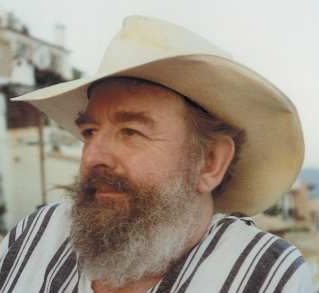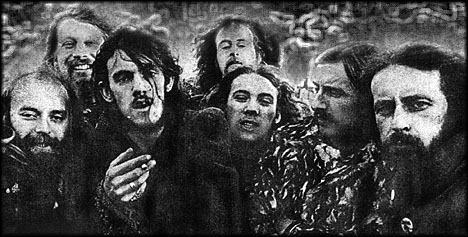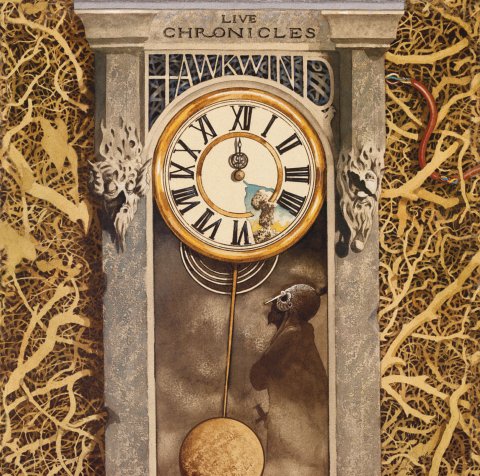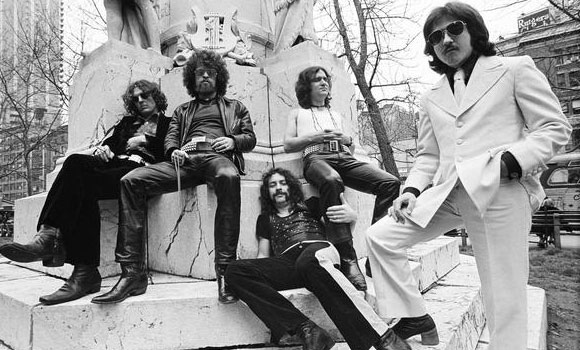Songs from the Multiverse: The Music of Michael Moorcock
 Friday, March 18, 2011 at 09:58AM
Friday, March 18, 2011 at 09:58AM I’ve had several folks ask me about the Moorcock-music connections that I mentioned briefly in the Manowar piece, so thought I’d put this up from anyone else that was curious.
Michael Moorcock not only played a huge role in the New Wave of science fiction (spreading the works of Master of the Multiverse such greats as Brian Aldiss, Norman Spinrad, and Roger Zelazny) but also created some of SF & F’s most memorable characters with Elric of Melnibone, Dorian Hawkmoon, and Corum Jhaelen Irsei, many of which were aspects of the Eternal Champion, a being doomed in an endless struggle to maintain Balance in worlds beset by the forces of Law and Chaos. And if that wasn’t enough, he developed the often copied concept of the Multiverse, which provides endless possibilities of realities for his protagonists to explore.
Master of the Multiverse such greats as Brian Aldiss, Norman Spinrad, and Roger Zelazny) but also created some of SF & F’s most memorable characters with Elric of Melnibone, Dorian Hawkmoon, and Corum Jhaelen Irsei, many of which were aspects of the Eternal Champion, a being doomed in an endless struggle to maintain Balance in worlds beset by the forces of Law and Chaos. And if that wasn’t enough, he developed the often copied concept of the Multiverse, which provides endless possibilities of realities for his protagonists to explore.
Music’s always played an important role in Moorcock’s work. In an interview with Terry Bisson, Moorcock said he listened to music whenever he wrote. Back in the early days of Elric, the Grateful Dead was his band of choice. At that time as well, he was inspiring, collaborating, and performing with the masters of  What many consider the classic lineup (Yes, that's Lemmy looking a little dazed and confused)space-rock, Hawkwind. Their album Doremi Falso Latido was inspired by Moorcock’s The Black Corridor. By the time the classic Space Ritual came out, he had been performing with them and had written one of their classic tracks: Sonic Attack. Their collaboration peaked with The Warrior on the Edge of Time, which is based on Moorcock’s Eternal Champion series. Dave is cited as saying he considers this work to be the epitome of Hawkwind. During this time, too, the band would occasionally show up in novels as the Hawkwind Orchestra. (There are also two books and a graphic novel which feature Hawkwind as the main characters. Written by Michael Butterworth, Moorcock is listed as the coauthor of the first one, The Time of the Hawklords, though supposedly he only did the initial outline.)
What many consider the classic lineup (Yes, that's Lemmy looking a little dazed and confused)space-rock, Hawkwind. Their album Doremi Falso Latido was inspired by Moorcock’s The Black Corridor. By the time the classic Space Ritual came out, he had been performing with them and had written one of their classic tracks: Sonic Attack. Their collaboration peaked with The Warrior on the Edge of Time, which is based on Moorcock’s Eternal Champion series. Dave is cited as saying he considers this work to be the epitome of Hawkwind. During this time, too, the band would occasionally show up in novels as the Hawkwind Orchestra. (There are also two books and a graphic novel which feature Hawkwind as the main characters. Written by Michael Butterworth, Moorcock is listed as the coauthor of the first one, The Time of the Hawklords, though supposedly he only did the initial outline.)
 After parting ways for several years, Hawkwind returned to the world of the Eternal Champion with 1985’s The Chronicle of the Black Sword. The entire album is a retelling of Moorcock’s Elric saga, and the following year, they released Live Chronicles, which captured what many fans believe to be their finest performance. They incorporated older songs and added a few new ones to expand upon the Black Sword album. Moorcock did several readings at a show at the Hammersmith, which is available on the remastered release. A DVD is also available; it contains all of Moorcock’s performances.
After parting ways for several years, Hawkwind returned to the world of the Eternal Champion with 1985’s The Chronicle of the Black Sword. The entire album is a retelling of Moorcock’s Elric saga, and the following year, they released Live Chronicles, which captured what many fans believe to be their finest performance. They incorporated older songs and added a few new ones to expand upon the Black Sword album. Moorcock did several readings at a show at the Hammersmith, which is available on the remastered release. A DVD is also available; it contains all of Moorcock’s performances.
In the seventies, Moorcock released a solo album titled New Worlds Fair. It’s an interesting affair, but to be honest, his voice is an acquired taste. The musicianship is strong and features many friends from his Hawkwind past. His band played some live shows, but the recording really never found a following. There were other recordings made, but a second album never emerged.
 Blue Oyster CultIn seventy-nine, Moorcock collaborated with American rockers Blue Oyster Cult on their Mirrors LP. His song, The Great Sun Jester, remains a fan favorite, and the band has played it live on several occasions. He came back again, teaming up with front man Eric Bloom, to write the Elric inspired Black Blade for Cultosaurus Erectus. This song, too, was an album and live favorite and was even released on Extraterrestrial Live. When the band released one of their most commercially successful albums, A Fire of Unknown Origin, Moorcock contributed Veteran of the Psychic Wars, which was also used in the soundtrack to the Heavy Metal motion picture. In 1987, when Moorcock was guest of honor at the very first DragonCon in Atlanta, Bloom showed up to jam with Moorcock on stage.
Blue Oyster CultIn seventy-nine, Moorcock collaborated with American rockers Blue Oyster Cult on their Mirrors LP. His song, The Great Sun Jester, remains a fan favorite, and the band has played it live on several occasions. He came back again, teaming up with front man Eric Bloom, to write the Elric inspired Black Blade for Cultosaurus Erectus. This song, too, was an album and live favorite and was even released on Extraterrestrial Live. When the band released one of their most commercially successful albums, A Fire of Unknown Origin, Moorcock contributed Veteran of the Psychic Wars, which was also used in the soundtrack to the Heavy Metal motion picture. In 1987, when Moorcock was guest of honor at the very first DragonCon in Atlanta, Bloom showed up to jam with Moorcock on stage.
So, there you go: a very, very brief look at Moorcock and music. I’m sure there are things I’ve forgotten to include (a couple come to mind right now) or don’t know about. I’d love to hear from your guys about it.
 Blue Oyster Cult,
Blue Oyster Cult,  Elric,
Elric,  Hawkwind,
Hawkwind,  Michael Moorcock in
Michael Moorcock in  Music
Music 
